Translation Committee
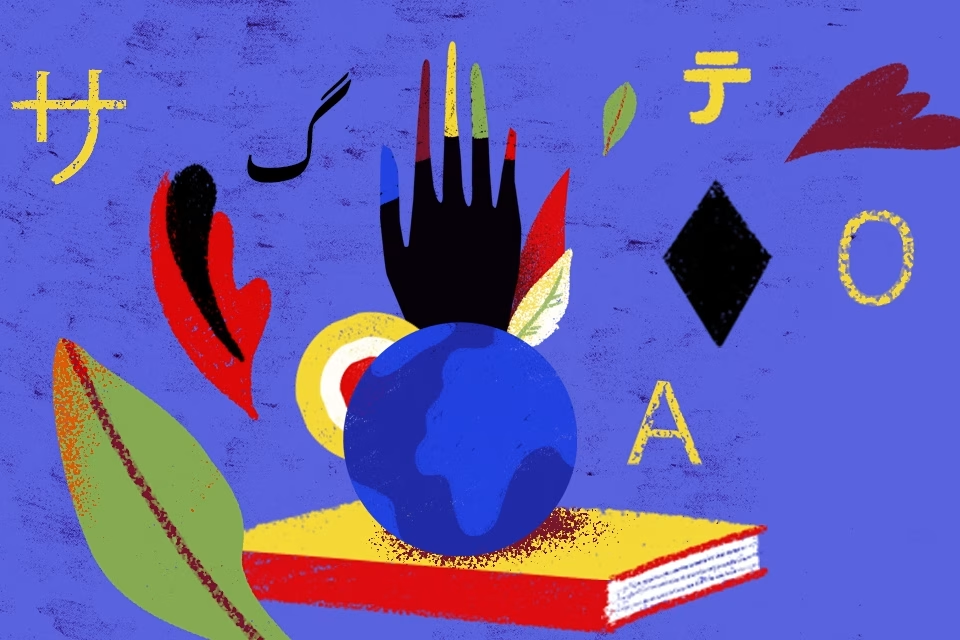
The PEN America Translation Committee advocates on behalf of literary translators, working to foster a wider understanding of their art and offering professional resources for translators, publishers, critics, bloggers, and others with an interest in international literature. The committee is currently co-chaired by Sandra Smith and Nancy Naomi Carlson. Allison Markin Powell is the Translation Committee Board Representative.
“Translators are faced with a choice. Either they can continue to do nothing to improve their lot or they can join together to ensure that at long last they will receive their due. The choice between apathy and active engagement in a struggle for recognition between silence and the living voice. The world of translation is still largely undiscovered and unexplored.” – from the Manifesto of the 1970 World in Translation conference.
Today the PEN America Translation Committee brings together translators throughout the country via virtual platforms to share resources and organize events, including the groundbreaking “Translating the Future” conference that commemorates the 50th anniversary of the first translation conference held in the United States, sponsored by PEN in 1970.
Women in Translation Month Reading Series
This August we’re celebrating Women in Translation (#WiT) Month! This reading series was initiated by blogger Meytal Radzinski in 2014 to raise awareness of translated literature by women, queer, and nonbinary authors, and promote gender and cultural diversity in literary publishing. This year, our free, virtual reading series gathers voices from across time zones for an international celebration!
The Manifesto
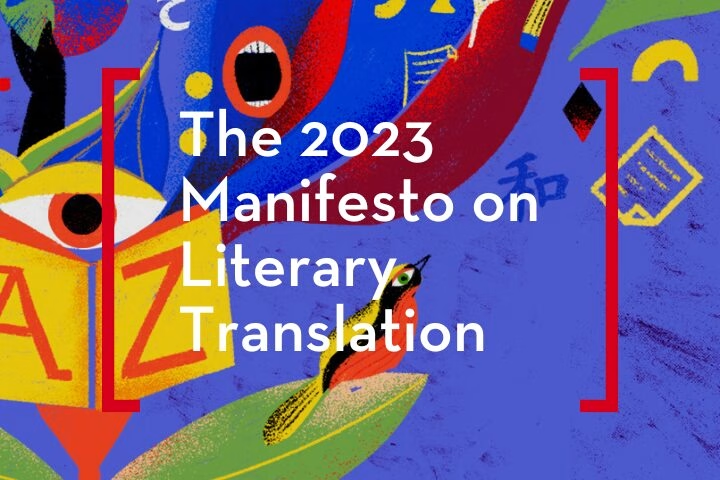
The committee is proud to present the 2023 Manifesto on Literary Translation to the literary translation community and to readers at large. The earliest version of a translation manifesto was penned in 1963 and signed by Robert Payne, who would later serve as chair of the translation committee. In preparation for the 1970 World of Translation conference, a group of translators from the committee began drafting an update to the eight-page pamphlet, Manifesto on Translation, published in 1969. We hope that the updated 2023 Manifesto on Translation will galvanize and inspire the translation community to deliberate and work together toward the goals enumerated within.
Awards and Grants
-
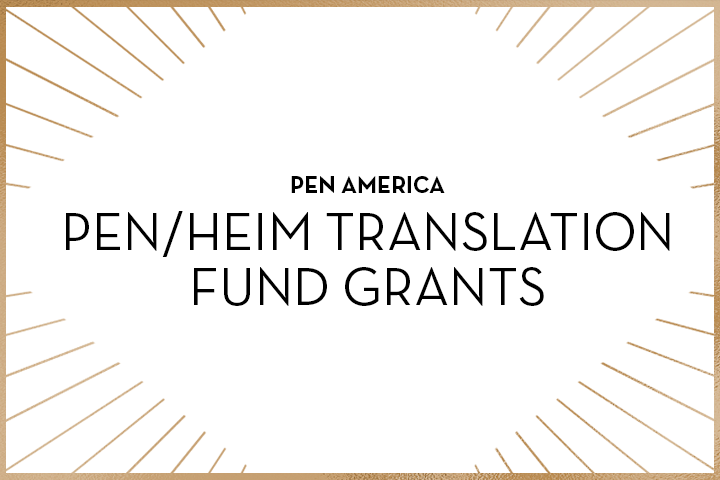
PEN/Heim Translation Fund Grants
-
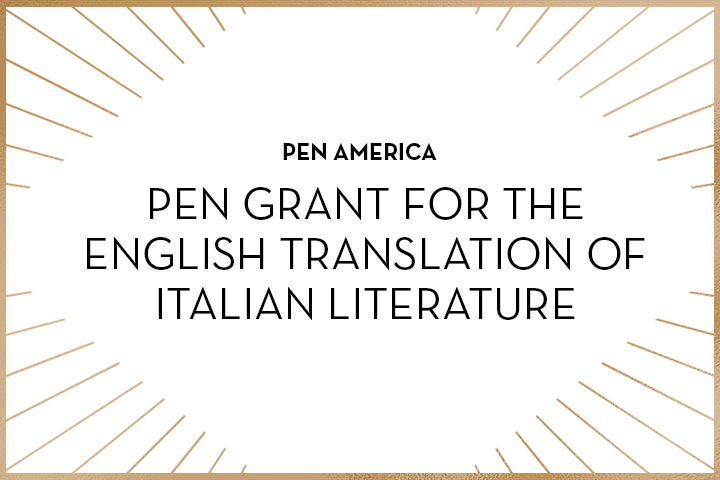
PEN Grant for the English Translation of Italian Literature
-
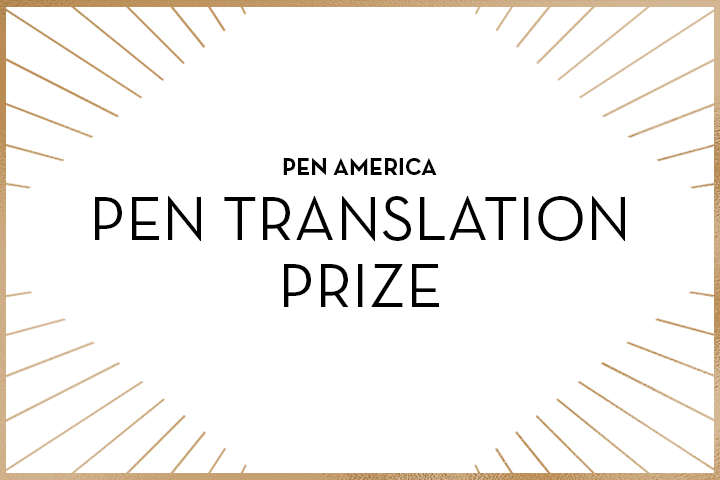
PEN Translation Prize
-
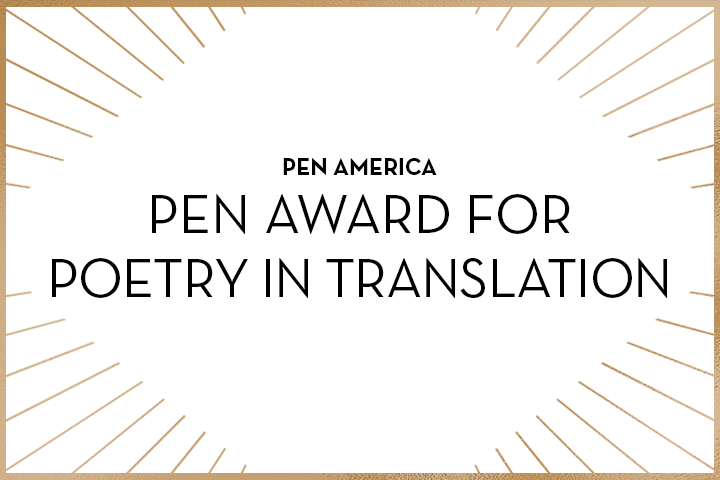
PEN Award for Poetry in Translation
-
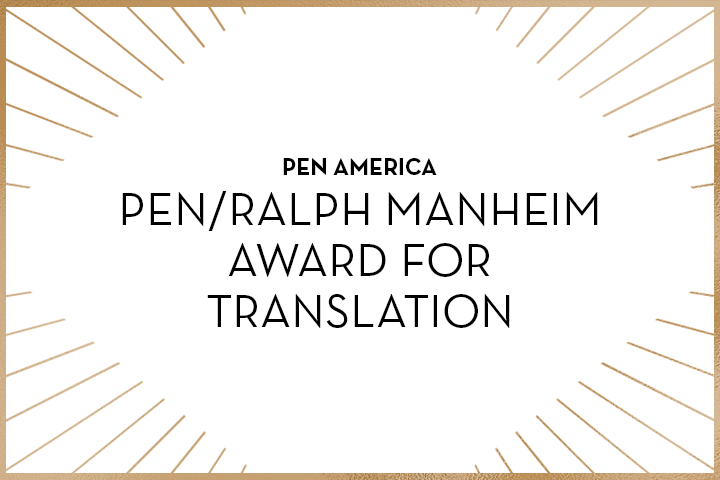
PEN/Ralph Manheim Award for Translation
Get Involved
Bimonthly Meetings
The committee convenes every two months and invite participants to take part in their many initiatives as well as to promote and receive support for their own work. If you are a PEN America Member who is interested in attending a meeting, please email the committee chairs at [email protected].
World Literature Speakers’ Bureau
In order to promote an appreciation of world literature and cultivate global solidarity within the general public in the U.S., members of PEN America’s Translation Committee are offering to speak at public libraries. Our members offer presentations on various topics related to the books which they have translated or the cultures/nations in which they specialize. These presentations can be made via Zoom or in person. While donations/honoraria for speakers will be appreciated, they are not mandatory. Learn more here.
Translator Database
Open to any translator who is a member of PEN America, the PEN Translator Database is a resource for publishers, editors, and professionals seeking translators for their literary and professional projects, as well as translators who are looking to connect with others in their field or region. The database can be easily sorted, searched, and filtered to find the translator(s) you’re looking for.
If you’d like to consider joining PEN America, you can find more information here.
Records in the Translator Database are maintained by the co-chairs of the PEN Translation Committee. If you are a translator who would like to be included in the Translator Database, just fill out this form and your information will be immediately included.
**Please note that any updates/corrections to your entry must be entered manually; resubmitting the form will only result in duplicate entries. Email your updates to us at [email protected] and we will do our best to make the necessary changes as soon as possible. Updates are made every two months at minimum, following our bimonthly meetings, but we will make every attempt to implement necessary changes as requested.
Below is a preview of the database. View the entire database here.
Other Translation Resources
World Literature Speakers’ Bureau for Public Libraries
In order to promote an appreciation of world literature and cultivate global solidarity within the general public in the U.S., members of PEN America’s Translation Committee are offering to speak at public libraries. Our members offer presentations on various topics related to the books which they have translated or the cultures/nations in which they specialize.
The Authors Guild Literary Translation Model Contract and Commentary
The Authors Guild Literary Translation Model Contract and Commentary (or “Translation Model Contract”) is intended specifically as an aid to translators in negotiating changes to publishers’ standard contracts. If your negotiations commence before the publisher offers you a contract, this document will also guide you in identifying the key points (scope of rights, payment terms, etc.) that you need to negotiate up front. (Published April 2021)
Negotiating Contracts: A Translator’s Checklist
You want to translate a book. A press is ready to publish it. They send you a contract. What should you be looking for? Fee, copyright, name on the cover, royalties, final say on the text? Due date? Publication date? With so many details to keep track of, it’s easy to overlook something. Translators from the PEN America Translation Committee, the Translators Association (UK), and the Literary Translators’ Association of Canada present a checklist to help you use their model contracts to get the best terms you can get.
Journals
A selection of literary journals seeking works in translation.
Publishers
A list of presses, large and small, that publish works in translation.
How to Review Translations
A series of posts by critics and translators at Words Without Borders.
Events
The best source for literary translation events in the NYC area is the “Upcoming Translation Events” page, maintained by Susan Bernofsky on the Columbia University website.
Organizations
The American Literary Translators Association
“The mission of the American Literary Translators Association is to support the work of literary translators, advance the art of literary translation, and serve translators, and the students, teachers, publishers, and readers of literature in translation.” See website for information about awards, mentorships, and the annual conference.
The Authors Guild
2017 Authors Guild Survey of Literary Translators’ Working Conditions
Topics
Women in Translation: a Tumblr by Translation Committee members Margaret Carson and Alta L. Price
The Business of Literary Translation: video of a four-part series co-presented by the PEN America Translation Committee and the Bridge Series, hosted by the Center for Fiction. Part 1: Breaking In | Part 2: Editing | Part 3: Contracts | Part 4: Bookselling
“Translators, Rates, Money, and Unions”: Translation Committee co-chair Alex Zucker, on the Three Percent podcast, talks about the business of literary translation.
Translation Programs
A list of undergraduate and graduate translation courses, workshops, and programs.
In Loving Memory
Pierre Joris (1946-2025) in Memoriam, by Kate Deimling
Pierre Joris was a kind and friendly presence at PEN Translation Committee meetings for many years. Underneath his easygoing bonhomie lay a powerful linguistic creativity and a tenacious ability to grapple with the work of one of the most challenging authors of the twentieth century, Paul Celan. Read the full obituary >>
Obituary for Paul Sohar (1936-2023)
Paul Sohar, a Seretary of the American Branch of the International PEN Writers in Exile, passed away on August 20, 2023 at the age of 87. Born in 1936 in Hungary, he fled the country at the age of 20 after the 1956 revolution was crushed by the Soviets.In the US, Paul worked as a chemist at Merck for 36 years. Throughout his distinguished scientific career, he published 26 papers and secured 13 patents. In the evenings and during his free time, he dedicated himself to his literary interests, publishing numerous poems and short stories under his own name, as well as poetry he translated into English from Hungarian and other European languages. He was an active member of the Modern Language Association (MLA), the American Hungarian Educators Association (AHEA), and the American Branch of the International PEN Club Centre for Writers in Exile.His work was recognized through numerous prestigious awards, including the Wordrunner Press Chapbook Prize (2011), the Janus Pannonius Lifetime Achievement Award (2016), and the Balassi Literary Translation Grand Prize (2021). He was nominated for the Pushcart Prize on two occasions.Read this obituary on The Star-Ledger.
Edith Grossman (1936-2023) in Memoriam, by Jonathan Cohen
The world of literature has just lost the supreme Spanish translator of our time, Edith Grossman. And I have lost a dear friend of some fifty years. She was Edie to me and to others who had a personal or professional connection with her. The genius translator of so many works from Latin America and Spain—from the fiction of García Márquez, Vargas Llosa, Mayra Montero, Carlos Rojas, and Cervantes, to the poetry of Nicanor Parra, Ariel Dorfman, Sor Juana Inés de la Cruz, and Góngora—to name just a few of the authors that she translated. She published nearly fifty books of translations, in addition to her brilliant critical book Why Translation Matters.Yes, Dan Shapiro, what a handsome woman she was—her intelligence blazing through those intense dark eyes. Yes, García Márquez, she was your voice in English. Yes, Harold Bloom, she was the Glenn Gould of translators. Yes, New York Times, she elevated the art of translation.One of the things I loved about Edie is that she could recite poetry from memory. Yeats was a favorite. At mention of him, she might take a deep breath and chant the opening lines of his “Under Ben Bulben”: “Swear by what the Sages spoke / Round the Mareotic Lake / That the Witch of Atlas knew, / Spoke and set the cocks a-crow.” A few years ago, after a sip of wine at a dinner she and I had together, she smiled and recited Stevenson’s famous couplet: “The world is so full of a number of things, / I’m sure we should all be as happy as kings.” Funny how she changed “I’m sure” to “I think.” She once told me she was “born to tweak.” Listen to her:Edie’s favorite toast in recent years was the Scottish “To them that’s away.” Now she’s away. And so, “To Edie who’s away / An, canna be here today.” The good news is her many books are here with us. They survive her, and her genius will continue to shine in them.The tributes given to Edie at PEN America’s celebration of her in 2016, in honor of her 80th birthday, offer a wonderful picture of her and her work. Mine was followed by my slideshow of her life, starting in the beginning and also including images of her book covers over time: Celebrating Our Translator Supreme Edith Grossman
John E. Woods (1942-2023) in Memoriam, by Shelley Frisch
Back in 1973, when I first read, and was dazzled by, a trio of works by the German writer Arno Schmidt—Nobodaddys Kinder, Das steinerne Herz, and Die Gelehrtenrepublik—Schmidt was virtually unknown in the US, and the English-speaking world had yet to await their brilliant translations into English by John Edwin Woods. Later that decade, John decided to try his hand at translation with Schmidt’s Abend mit Goldrand. Published by Helen Wolff at Harcourt Brace Jovanovich as Evening Edged in Gold, his translation garnered both the National Book Award and the PEN Translation Prize (then called the PEN/Book-of-the-Month Club Translation Prize). Translations of other Arno Schmidt works soon followed (including the aforementioned trio, as, respectively, Nobodaddy’s Children, The Stony Heart, and The Egghead Republic). John broadened his translation oeuvre to encompass novels by Patrick Süskind (Perfume, which also won the PEN Translation Prize), Thomas Mann (Joseph and His Brothers, The Magic Mountain, Doctor Faustus, and Buddenbrooks), Christoph Ransmayr, and Ingo Schulze, among others. John’s many awards also include the inaugural Helen and Kurt Wolff Translator’s Prize, the Schlegel-Tieck Prize, the Ungar German Translations Award, and the Goethe Medal. Every one of his translations sparkles with linguistic inventiveness that reflect John’s joy and brilliance in wordplay.In a 1997 interview, John summed up his philosophy of translation in words that resonate with me as I work my way through my own translation projects: “I’ve come to believe that translation itself is an impossibility. Because what happens, of course, is that ultimately I end up creating a new text for new readers in a new context. The original and its translation are not the same. I cannot, to use a good old word … , repristinate the original experience.”As John’s final and crowning achievement as a translator, he undertook what might well be considered the ultimate untranslatable novel, namely Arno Schmidt’s gargantuan Zettel’s Traum (1970), a book so weighty—literally and semantically—that surely only John could have brought it to completion, its 1495 pages emerging from his desk as Bottom’s Dream in 2016. This novel was inspired by James Joyce’s Finnegans Wake, particularly in its use of what Schmidt called the SpaltenTechnik (“column technique”), and focuses thematically on translating the works of Edgar Allan Poe into German while actually centering on an astonishingly innovative use of language and typography that makes its extraordinary medium the book’s ultimate message. John’s translation showed his amazing wordsmithery to best advantage in this final masterpiece.I first met John Woods in person shortly after we co-translated a book, Hannelore Brenner’s The Girls of Room 28: Friendship, Hope, and Survival in Theresienstadt, published by Schocken in 2009. During my visit to Berlin about a year after that publication, we met at his apartment in Berlin-Mitte (in moving to Berlin from California, he had been adamant about selecting a home in the former East Germany of that once-divided city, as a political declaration), where I got to see for myself the mile-high piles of printouts of his evolving translation of Schmidt’s magnum opus. We then embarked on a tour of his favorite neighborhood spots. One highlight was the Dorotheenstadt Cemetery, the burial place of many famous writers, among them Hegel, Fichte, Heinrich Mann, Bertolt Brecht, and Anna Seghers; the other was the Honigmond Hotel on Tieckstrasse, John’s favorite brunch spot. In 2012, we got together again, in Binghamton, New York, for a conference called “Doppelgängers and Fraternal Twins,” where we both spoke about translation. John sketched out a flow chart for his Bottom’s Dream translation-in-progress, and his merriment and excitement in recreating this work in English, neologisms and all, kept his audience spellbound.John and I arranged to meet again in Berlin, during a wintry January when the streets were covered in black ice. Unfortunately, John slipped and fractured his hip on the way to the Literarisches Colloquium Berlin, where I was directing a translation workshop, and instead of celebrating with our translation gang, he had to recuperate at home. And recuperate he did, fully and in short order. Having survived other serious ailments as spry as ever, John seemed invincible, but his last encounter with illness this year proved otherwise. Those who know his work will miss him for the beauty he brought to the world of translation, and those who knew him will also miss his kindness and generosity. Thinking of John invariably lifts my spirits; his unflagging good humor, his inspirational writing, and his enduring friendship have enriched my life.
